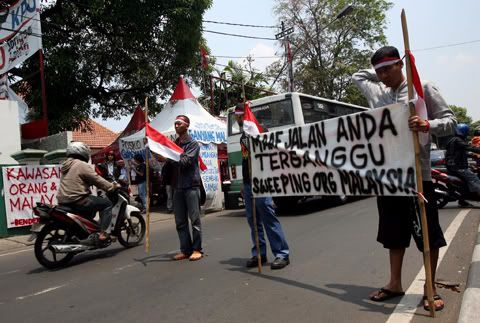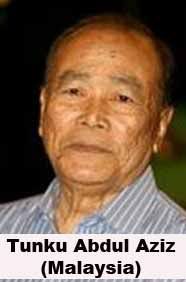
(Photo courtesy of The Sun)
Jakarta - Indonesia, 08 September 2009 : Indonesian volunteers hold an anti Malaysian banner as they look for Malaysians in Jakarta, Indonesia, on 08 September 2009. Indonesian activists created a registration booth to find volunteers to attack Malaysia. The action came after the latest Malaysian claim over Indonesia cultural heritage. Last August Malaysian tourism TV ads sparked anger among Indonesian as the ads includes a traditional Balinese dance of Pendet at part of Malaysian culture. In 2007 a similar row broke as Malaysia use a song written by an Ambonese in an advertisement to promote Malaysia's tourism. Dispute between the two nations dated back from 1964 when Indonesia's first president Soekarno severed diplomatic tie with the former british colony over Soekarno's accussation that Malaysia was acting as a puppet for its former occupant.
The Indonesia-based blogger, "Unspun" posted an article from the Jakarta Post entitled, " Of different Malays: The problem of boundaries" following a spat of angry protests by Indonesians that Malaysians and Malaysia authorities are "stealing Indonesian cultural assets" .
The Indonesia-based blogger "Unspun" has followed this issue in several postings: Read here and here and here and here and here
Quote
"...Malay culture is considered by Indonesians in reference to the dances of Lilin, Randai and Serampang Dua Belas, and has no direct connection to the Javanese gamelan, the Reog or the angklung.
Most Malaysians, including the government of Malaysia, however, fail to see these as being of DIFFERENT cultural lineage. They lump them as belonging to Malay (Melayu) culture.
From elementary school, Indonesian kids learn about national heritage by memorizing the names of dances, folk songs and visual representations of traditional costumes.
Malaysians seem to see a DIFFERENT boundary for Malay culture.
The ways in which local culture is framed in Indonesia are much LESS crude than in Malaysia.
(In Indonesia) the practice of documenting and selecting material artifacts of local cultures is part of the larger political process of inclusion that stresses nationalism and the national unity of Indonesia.
Malaysia adopts a DIFFERENT route in approaching its national and local cultures. The modern nation-state of Malaysia frames national culture by clustering cultural artifacts into the Malay, Chinese, Indian and indigenous tribe (orang asli) cultures. The term Malay here (as used in Malaysia) differs from that of Indonesia, and refers to and is influenced by several concepts.
(In Malaysia), first, as enacted in the term "Malay is Muslim, Muslim is Malay", it is a form of ethno-religion. It is entwined with the concept of ethnic nationalism that has become today's Malaysia's dominant state-religion relations in which the state is fused to a particular ethnic group and religion functions as a signifier of ethnic identity.
Second, it is used in association with the Malay race (bangsa Melayu) instead of the Malay ethnicity (suku Melayu).
The modern nation-state Malaysia cultivates this heavily politicized classification by clustering Malaysians into Malays, Chinese, Indians and indigenous tribes.
Malaysian version of MALAY is more a product of political reconstruction (of colonialism and a modern ethnic nationalism) and is rooted in the politics of race and identity rather than the geographical boundary of origin.
Lumping together various artifacts into one Malay culture whose boundary is heavily politicized is certainly NOT the most plausible method to complete the task. It fails to recognize the complexity of the cultures of the archipelago...."
-Dr. Merlyna Lim
Below is the Jakarta Post article, "Of different Malays: The problem of boundaries".
It represents a viewpoint from an Indonesian perspective.
Of Different Malays: The Problem of Boundaries
by
Merlyna Lim
 Merlyna Lim is an Indonesian professor based in Arizona State University, Tempe, USA. She is Assistant Professor of the Consortium of Science, Policy and Outcomes and the School of Justice and Social Inquiry at Arizona State University. Her teaching and research interests revolve around mutual shaping of technology and society and political culture of science, technology, and cities, in relations to issues of globalization, democratization and (in)equity.
Merlyna Lim is an Indonesian professor based in Arizona State University, Tempe, USA. She is Assistant Professor of the Consortium of Science, Policy and Outcomes and the School of Justice and Social Inquiry at Arizona State University. Her teaching and research interests revolve around mutual shaping of technology and society and political culture of science, technology, and cities, in relations to issues of globalization, democratization and (in)equity.She holds the following awards: Annenberg Networked Publics Research Fellowship (2005-2006), Henry Luce Southeast Asia fellowship (2004), Oxford Summer Doctoral Fellowship (2003), NWO Wotro Fellowship (2003-2005), and ASIST International Paper Contest Winner (2002) and has given more than 50 invited lectures and presentations in various places in the United States, Canada, Australia, Europe, and Asia. Read here her profile.)
THE recent furor caused by the Discovery Channel's mistaken insertion of the Balinese Pendet dance into a TV spot for Malaysia has reopened an old wound of Indonesians, who believe Malaysian has repeatedly stolen Indonesian cultural heritage, including the song "Rasa Sayange", the angklung, and the Reog Ponorogo dance, among others.
For most Indonesians, that the Malaysian government can claim these things is bewildering.
Regular Indonesians would undoubtedly associate these three intangible cultural items with three different origins:
- "Rasa Sayange" is Ambonese/Maluku,
- the angklung is Sundanese, and
- the Reog Ponorogo is Javanese.
MALAY culture is considered by Indonesians in reference to the dances of Lilin, Randai and Serampang Dua Belas, and has NO direct connection to the Javanese gamelan, the Reog or the angklung.
It is directly associated with the traditions and customs of the ethnic group within the boundary of the Malay peninsula.
Malaysians seem to see a DIFFERENT boundary for Malay culture.
Why is this?
The Indonesian Perspective
Knowledge and narratives of local culture in Indonesia are developed in association with ethnic-based regional boundaries. They are endorsed by the state and they are part of nation building.
From elementary school, Indonesian kids learn about national heritage by memorizing the names of dances, folk songs and visual representations of traditional costumes.
The practice of documenting and selecting material artifacts of local cultures is part of the larger political process of inclusion that stresses nationalism and the national unity of Indonesia. Selective preservation of regional and/or local art forms, in constructing the national culture, is therefore part of the politics of exclusion.
Recognizing this pitfall, however, the ways in which local culture is framed in Indonesia are much LESS crude than in Malaysia.
It is still assigned and identified with a certain cultural context/geographical (of origin). While being partial and reductionist, multifarious contexts and diverse locales still have some space in the narrative of Indonesian national culture.
The Malaysian Perspective
Malaysia adopts a different route in approaching its national and local cultures.
The modern nation-state of Malaysia frames national culture by clustering cultural artifacts into the Malay, Chinese, Indian and indigenous tribe (orang asli) cultures. The term Malay here differs from that of Indonesia, and refers to and is influenced by several concepts.
First, as enacted in the term "Malay is Muslim, Muslim is Malay", it is a form of ethno-religion. It is entwined with the concept of ethnic nationalism that has become today's Malaysia's dominant state-religion relations in which the state is fused to a particular ethnic group and religion functions as a signifier of ethnic identity.
Any Javanese, Acehnese or other Indonesian who migrated to Malaysia will be classified as Malay and are expected to be Muslim. Chinese-Indonesians, though, can box themselves as Chinese, thus do not have to be Muslim.
Second, it is used in association with the Malay race (bangsa Melayu) instead of the Malay ethnicity (suku Melayu).
This concept originated in Blumenbach's racial classification system, which divides the world's races into the Caucasian/white race, the Mongolian/yellow race, the Malayan/brown race, the American/red race and the Negroid/black race. His skull-based concept has been rejected by many anthropologists who recognize the enormous complexity of classifying races.
Blumenbach's racial classification system of Malay adopted in Malaysia
He considered the inhabitants of Southeast Asia, including the Marianas, the Philippines, the Malukus, Sundas and Pacific Islands as Malayan. Blumenbach wrote, "Malay variety. Tawny-colored; hair black, soft, curly, thick and plentiful; head moderately narrowed; forehead slightly swelling; nose full..."
The concept of the Malay race is also a historical heritage of colonialism. European planters and British officials in Malaysia were keen to obtain laborers from the Dutch East Indies because they were regarded as being better suited to the climate and would assimilate more easily with the local Malays.
Indonesian migrants were viewed as originating from the same racial stock as the Malays, regardless of ethnicity.
In early colonial Malaysia, the Straits Settlements censuses of 1871 and 1881 both listed "Malay, Achinese, Andamanese, Boyanese, Bugis and Javanese" separately.
In the 1891 census, however, there were major structural changes in the classification of ethnicities. The 48 different ethnicities were sorted under the major (hierarchical) classifications of "European and American, Eurasian, Chinese, Malays and other Natives of the Archipelago, Tamils and other Natives of India, and Other Races".
The creation of the category "Malay and other Natives of the Archipelago" and the inclusions of the various ethnicities in it contributed toward formalizing the boundaries of Malay-ness.
The modern nation-state Malaysia cultivates this heavily politicized classification by clustering Malaysians into Malays, Chinese, Indians and indigenous tribes.
Tracing the origin of the term Malay as used in Malaysian context, we thus can understand that the Malaysian version of Malay is more a product of political reconstruction (of colonialism and a modern ethnic nationalism) and is rooted in the politics of race and identity rather than the geographical boundary of origin.
Domestic Politics and Malay Culture
As people move around globally, cultures flow in all directions. Tracing the histories and origins of culture is thus always a complicated task. Lumping together various artifacts into one Malay culture whose boundary is heavily politicized is certainly not the most plausible method to complete the task.
It fails to recognize the complexity of the cultures of the archipelago, thus removing them from their multifarious contexts and locales and uprooting these cultures from the people who shape and are reshaped by them.
As for Indonesia, it is time to recognize and appreciate local cultures not by treating them as symbols to justify unity and diversity, but by supporting and caring for the people who work tirelessly in preserving and maintaining these cultures.
-Merlyna Lim
RELATED ARTICLE
Indonesia, We are NOT Your Whipping Boy
by
TUNKU ABDUL AZIZ
Vice Chairman,
DAP -Malaysia
 Tunku Abdul Aziz founded the Malaysian Chapter of Transparency International , now the Malaysian Society for Transparency & Integrity of which he was the President until December 2004. In October 1997 he was elected to the international board of Transparency International and in March the following year, he became Vice-Chairman of the Board of Directors of Transparency International. He was re-elected Vice-Chairman of the Board of Directors in October 1999 and relinquished that position in October 2002. Tunku Aziz has written and spoken widely on corruption and integrity issues both domestically and internationally. His book, Fighting Corruption: My Mission, was released in 2004.
Tunku Abdul Aziz founded the Malaysian Chapter of Transparency International , now the Malaysian Society for Transparency & Integrity of which he was the President until December 2004. In October 1997 he was elected to the international board of Transparency International and in March the following year, he became Vice-Chairman of the Board of Directors of Transparency International. He was re-elected Vice-Chairman of the Board of Directors in October 1999 and relinquished that position in October 2002. Tunku Aziz has written and spoken widely on corruption and integrity issues both domestically and internationally. His book, Fighting Corruption: My Mission, was released in 2004.He is a member of the World Bank High Level Advisory Group on Anti-Corruption in the East Asia and Pacific Region, and a member of the Advisory Board of Global Public Policy Networks, a project of "Visioning the UN", an initiative of the Secretary-General of the United Nations and the United Nations Foundation.
He also serves as a member of the Asian Pacific Advisory Panel on Good Urban Governance, and is a member of the Board of the International Institute of Public Ethics. He was a member of the UNDP Advisory Panel for the Human Development Report 2002. He is on the Global Advisory Council of Caux Roundtable, a US-based business organization promoting, among other things, principles of good governance. In February 2004 he was appointed a member of the Royal Commission inquiring into the police service.
He was appointed, in Feb. 2006, Special Adviser to the Secretary General of the United Nations, and in that capacity set up the UN Ethics Office. He returned from New York on completion of his work in January 2007.Tunku Aziz is a columnist for the New Sunday Times', and sits on the Global Advisory Board of the Caux Round table and is President of the Caux Round table Malaysia. Tunku joined the DAP in August 2008 and is currently the DAP National Vice Chairman.
Read here for more
The Javanese have done it again. They have burned our national flag.
Many years ago, I was interviewed in London by BBC Radio 2 as part of a series on the great languages of the world.
I was asked about some significant differences between Bahasa Indonesia and our own Bahasa Melayu. I feigned ignorance about the existence of a language called Bahasa Indonesia. I said what Indonesia claimed as its language is really Bahasa Melayu.
They had no choice but to use Bahasa Melayu, the lingua franca of the Malay world to communicate among themselves because they never had a common language to begin with.
Malay is undoubtedly the basis of their language. So, if we do what they in Indonesia do so well, we should be burning their flag every day because they have purloined our national language.
An excessive display of nationalistic zeal is generally considered "ugly" in civilised societies. The Indonesians by their actions have reduced themselves into sad figures of ridicule and fun. Their claim, and not for the first time, that we have infringed their "cultural copyrights" is totally absurd. They now have got it into their heads that we should stop singing our national anthem because the tune was Indonesian. What else next? Stop eating satay and wearing kain batik because these are Indonesian?
I remember the time when Indonesia took it upon themselves to rename the Indian Ocean as the Indonesian Ocean, and had the new name put on their official map. The Indians demurred, and Sukarno the regional bully boy realised that it was not such a clever thing to do after all.
Last year we had Wahyu Susilo of Migrant Care, an influential labour organisation telling us "We also want Malaysia to legalise illegal workers and not simply deport them home." Then, again last year we were reminded by Indonesian lawmakers that Malaysia-Indonesia relations were "at their worst since Sukarno's days of Konfrontasi in the sixties."
The reference to Konfrontasi is mischievous in the circumstances. It was a attempt to stampede us into submitting to their will. Indonesians should want to forget that disastrously miscalculated adventure which ended with a bloody nose for their country.
On the positive side, it brought to an end the reign of the megalomaniac Sukarno only to be replaced by the rapacious Suharto. Perhaps we had a match in our own country, and we should not gloat over it too much.
As a matter of interest, even the normally calm and staid Najib when Deputy Prime Minister was moved to refer to Malaysia as the "Whipping Boy" of the Indonesian media whenever they felt they had a grievance, real or imagined, against us.
I mention all this as a way of reminding ourselves that history provides important lessons for us all. Patterns of political behaviour are often deeply entrenched in the consciousness of a nation, and in the case of our big and unwieldy neighbour, this phenomenon is more marked than is good for them. We want to continue to maintain good neighbour relations with Indonesia, but Indonesia must remember that we are not a client state, and there is a limit to how far we are prepared to go to be nice. We have to think about protecting our national security interests and not putting them at risk. After all, our responsibility is to our own people, first and last.
I recall vividly the burning of our flag in 2002 in Jakarta, that very violent capital of Indonesia. Dr. Mahathir, the then Prime Minister responded in a statesman-like manner to the crude officially orchestrated provocation in which the petulant Speaker of the People's Consultative Council, Amein Rais played a big role.
So, in the most recent incident, we were yet again treated to a pattern of behaviour that seems to have been well integrated into the great Indonesian cultural psyche, and that is part of their culture they can keep without any fear of copyright infringement by Malaysia.
It is obviously difficult for us to engage such a volatile country without causing offence and endless misunderstandings, but we must show patience and wisdom and do all we can to keep the relations on an even keel.
Indonesia is still a country in transition and has yet to find its own realistic level in international relations. It seems to lack the confidence of a potentially rich and credible nation, and therefore occupies its time in the luxury of blaming others when things do not go their way.
I suppose they will now want to take back all their nearly two million nationals, both legal and mostly illegal, working hard, and robbing hard, to keep body and soul together.
Grow up Indonesia! We are not your whipping boy.
No comments:
Post a Comment